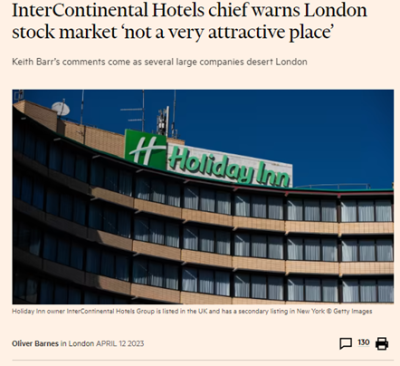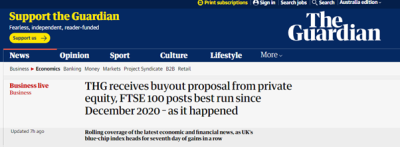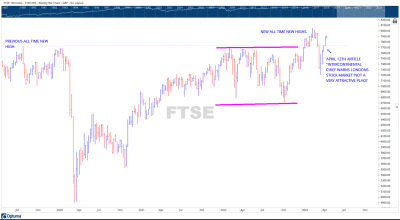If you would like to receive weekly updates like this, sign up here.
I’d like to place my apologies in advance here.
For any readers who have tried to eke out any kind of return on the UK stock markets last year and have resorted to the following.

Source – FT
It was a challenging year for active managers in European equities…recording its highest annual underperformance rate.
So states an excerpt from a recent article from the Financial Times on the performance of UK-based fund managers.
It’s hardly surprising to note that most of the best performing ones were exposed to fixed income.
They can thank an extraordinarily fast and rapid interest rate rising environment for that.
So, if you are someone who prefers to invest your capital in the UK or European markets, or perhaps more comfortable with the less risky but still high performing fixed income route, you may wish to keep reading.
Even if you reside outside the UK, allocating part of your portfolio to exposure in the UK equities market during the 2nd half of the 18.6-year Real Estate Cycle (where we are presently) has proven quite lucrative in the past.
Heck, even if you simply invest in your own country’s stock exchange.
Because you will notice there is currently a huge disconnect happening now.
News about the UK equity markets is quite bearish. In fact, even real estate is getting a serve of negativity too.
But is it true?
Should you be staying on the sidelines and waiting this one out?
Or do you dive headfirst in when there is blood (metaphorically, of course) on the streets?
Today I will offer you proof of what to do.
And you will, like me I’m sure, be absolutely flummoxed by how the financial media can get this simple trick wrong.
Every. Single. Time.
Read on to find out how.
You stay out of the markets when you read things like this – right?
There is one thing to note about equity managers before we start.
They are really like a herd of sheep. As their performance is benchmarked against what other funds do, they rarely, if ever, do anything outside the ordinary.
And the reason is they can’t afford to lose client funds to a rival fund manager who is showing even a few percentage points higher returns.
So, if equities have a good year, then they will all do well.
But it also means what during a bad year for equities? From the FT article quoted above:
However, the real shocker was the performance of active UK equity funds. A massive 92 per cent of large-cap funds and 97 per cent of mid-cap funds underperformed their benchmarks in 2022. That is the worst annual results on record, S&P noted.
About 67 per cent of UK funds specialising in smaller stocks underperformed in 2022.
Yep, you guessed it: in a bad year, they will all collectively suck.
Now, you may say that in part this may be related to currency manipulation. By that I mean the US Fed’s interest rate rise campaign which meant the US dollar remained strong relative to the British pound and the euro.
Maybe that’s fair…. a little; but to accept this as the key factor doesn’t come close to explaining such abject performance.
Certainly, it wasn’t a big factor in the recently released SPIVA (The S&P Indices Versus Active) US scorecard for the full year 2022 performance of European based fund managers.
It was a challenging year for active managers in European equities, with the Pan-European Equity category recording its highest annual underperformance rate since the SPIVA Europe Scorecard’s inception in 2014.
Fixed income managers had a better year in relative terms, with the majority outperforming in 5 of 11 categories over the one-year horizon. Across both asset classes, however, underperformance rates increased to a similarly high average over a 10-year horizon.
Here’s where, if you’ve seen it before, the usual hysterics from the media will come out in full force.

Source – FT
Note the date, we will come back to that.
The chief of Holiday Inn owner InterContinental Hotels Group has warned that the UK stock market is “not a very attractive place” for listed companies and called on authorities to get on the “front foot” to arrest further decline.
“When we listed, there was probably no reason to even think about listing in the US for our primary listing because the FTSE was the FTSE, and it was incredibly liquid . . . but things have changed,” said Keith Barr.
“The general consensus is [London’s] not a very attractive place to list new companies versus other markets,”
Sounds damning doesn’t it.
But is it true?
On the surface it’s a curious take from someone like Keith Barr given that travel across the globe has rebounded hard since the global economy reopened.
You’d imagine that Holiday Inn would be well positioned to take advantage of it.
But let’s look at the bigger picture instead. The reason for this newsletter.
Are Keith Barr’s comments and the underperformance of UK based fund managers speaking to a deeper systemic problem with the UK stock market?

Or any other market for that matter?
I mean, surely if the ‘professionals’, those huge fund managers who are lauded across the financial media, can’t seem to make a quid after a full year of trying, what hope do you and I have?
The ‘trick’ that places you above 99% of fund managers.
I am running the risk of turning blue in the face. Again.
I’ve said this to you many, many times.
There is one thing in life that will not, cannot, lie to you.
And that’s a stock chart.
As long as you can read what it’s trying to tell you.
So, I was very interested to see what kind of carnage the chart showed us. I mean, remember the professionals banked record losses and some of the worst performance of funds under management in a long while.
Here is the chart.
Huh?!
I mean – what carnage? Can you see near the middle of the chart the 2 pink horizontal lines?
That’s the performance of the FTSE 100 index for 2022.
What we have here is a large price channel which indicates, amongst other things, the market went sideways most of the year. Sometimes up, sometimes down.
Sure, there’s no clear sustained run higher, just price bouncing between support and resistance.
Is this “really” what causes some of the worst performance of funds under management for many years?
Almost all western markets had a very tough time of it in 2022, a consolidation year. In fact, the NASDAQ was badly hit last year.
Compared to them, the UK FTSE held up very well in comparison in 2022.
Yes, in a year where markets consolidate, which is what transpired for 2022, it can be tough to reach benchmarks when no clear trend develops.
I find it difficult to think that 92% of UK fund managers significantly underperformed though.
The fact is the chart doesn’t scream to me utter collapse nor that this market is a train wreck and needs to be avoided at any cost.
And what happens from the start of 2023 certainly clinches it for me.
I’ve labeled the date of the article from Holiday Inn CEO Keith Barr on the upper right-hand side of the chart.
Right before the FTSE retested and then broke above the previous all-time high back in August 2019.
Price is now moving to test and perhaps break into ALL TIME NEW HIGHS (ATNH)!
Are you starting to feel that such abject deception of these articles is deliberate?
No wonder so many of you get confused about what to believe and what to do when you rely solely on what the media is saying to you.
I mean, look at today’s headline.

Source – The Guardian
The current set-up of the FTSE 100 today is bullish!
And this is EXACTLY what you’d expect at this point of the cycle.
Why then are so-called reputable financial media like FT running articles like the one we have reviewed here?
When it’s so obvious why you can safely ignore them and simply bring up a chart.
You just need to know how to read it. And relate your reading of that chart back to the overall cycle.
And if we see in the next few weeks or so prices come back down to touch or bounce back off the pink dotted line (which represents the former ATNH price) then I know precisely what this chart wants to do in the future.
And you can learn this too via a membership to the Boom Bust Bulletin (BBB). Give me the opportunity to take you in depth into the cycle.
Learn about the over 200-year history of the 18.6-year Real Estate Cycle and why even today it continues to repeat like clockwork.
It will teach you how to decipher the news that we get bombarded with every day to focus solely on what truly matters.
No more negativity and noise, just the science of the economic rent and the timing inherent in the real estate cycle.
This is all you need to succeed.
The reason why markets perform like the FTSE did in 2022 is that it’s consolidating and building energy for a future move, either higher or lower.
Your job is to interpret the chart and know what the signs are that the next move is higher or lower. Then invest accordingly.
We have that signal now: the question is – where does price go from here?
Do you “really” think you can place your money in the hands of the financial media or social media reports?
Or are you ready to take charge yourself and let the market show you what it’s doing next?
That’s how the BBB can help.
As a Boom Bust Bulletin member you will receive 12 monthly editions a year detailing all the key turning points of the cycle, a deep dive into the most important markets across the globe and ways that you can personally benefit from this knowledge.
All derived from our unique and proprietary research – which you’ll not find anywhere else.
Plus, you’ll receive exclusive invites to BBB member-only webinars when we run them.
All this for just US $4 a month, less than a takeaway coffee.
Best wishes,

Darren J Wilson
and your Property Sharemarket Economics Team
P.S. – If you would like to receive weekly updates like this, sign up here.
P.P.S – Find us on Twitter here and go to our Facebook page here.
This content is not personal or general advice. If you are in doubt as to how to apply or even should be applying the content in this document to your own personal situation, we recommend you seek professional financial advice. Feel free to forward this email to any other person whom you think should read it.




